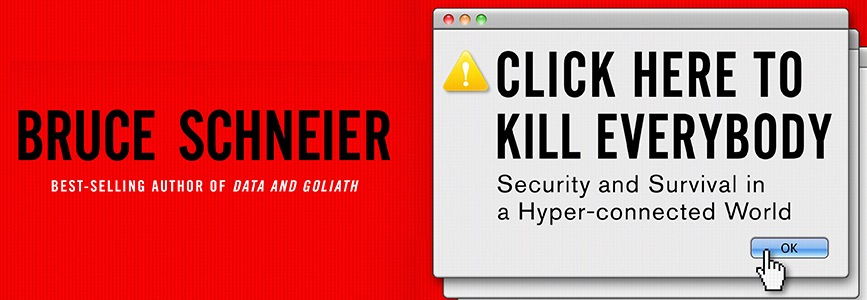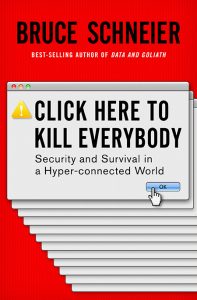
Click Here to Kill Everybody: Security and Survival in a Hyper-connected World, by Bruce Schneier
Two centuries ago, The Modern Prometheus (better known as Frankenstein) inspired nightmares by showing how innovation can go horribly wrong. In 2018, cryptographer and privacy expert Bruce Schneier has detailed the many ways that technology can not only go wrong—but become deadly. For a book that might have been called The Post-Modern Prometheus, Schneier chose a more direct title: Click Here to Kill Everybody.
As our cars, toys, fitness trackers, planes, and power grids are increasingly placed under the control of software and embedded computer chips, we face ever-greater threats to our privacy, health, and safety. Thieves with basic hacking skills can disable home security systems and steal personal data with malware placed on home routers. Schneier predicts that it will soon be just as easy to commit murder over the internet by disabling an insulin pump or pacemaker. With a bit of high-level training, a terrorist could shut down a country’s power grid upon command or start a global pandemic with a manipulated bioprinter.
Whereas Frankenstein created a monster he could not control from recycled limbs and flesh, computer scientists have used computer chips to build a creature that no one can control: “Internet+”. Schneier coins the term to refer to the “system of [connected] systems” that “senses, thinks, and acts” by operating our IoT devices. Twenty years ago, we had to log on to access the internet. Today, Schneier shows how the internet interacts with us all the time—whether we’re turning on the oven with our smartphone, using e-banking apps, or controlling air traffic through a database. If something goes wrong, it can bring headaches, financial ruin, or death.
Why has Internet+ become so dangerous? Schneier points to three key causes: the mass production of cheap computer chips and software with weak cybersecurity; the lack of a cohesive regulatory system over the IoT industry; and the development of a new global arms race, where the ability to manipulate technology equals power. To make matters worse, our need for larger, well-trained cybersecurity taskforces to make Internet+ more secure cannot keep up with growing demand for connected products—nor with the growth of new hacking technologies.
 Not surprisingly, solutions to these problems are difficult to come by and even harder to enforce. Schneier has a variety of recommendations for all players involved, from consumers to tech developers. But Schneier underscores that government and industry have the greatest role to play in making Internet+ safer and more sustainable. Airplanes were once the most dangerous means of travel, yet they are now among the safest after decades of dedicated government regulation and heightened corporate accountability. The same is possible for Internet+.
Not surprisingly, solutions to these problems are difficult to come by and even harder to enforce. Schneier has a variety of recommendations for all players involved, from consumers to tech developers. But Schneier underscores that government and industry have the greatest role to play in making Internet+ safer and more sustainable. Airplanes were once the most dangerous means of travel, yet they are now among the safest after decades of dedicated government regulation and heightened corporate accountability. The same is possible for Internet+.
For more information visit www.EPIC.org. Defend Privacy. Support EPIC.



